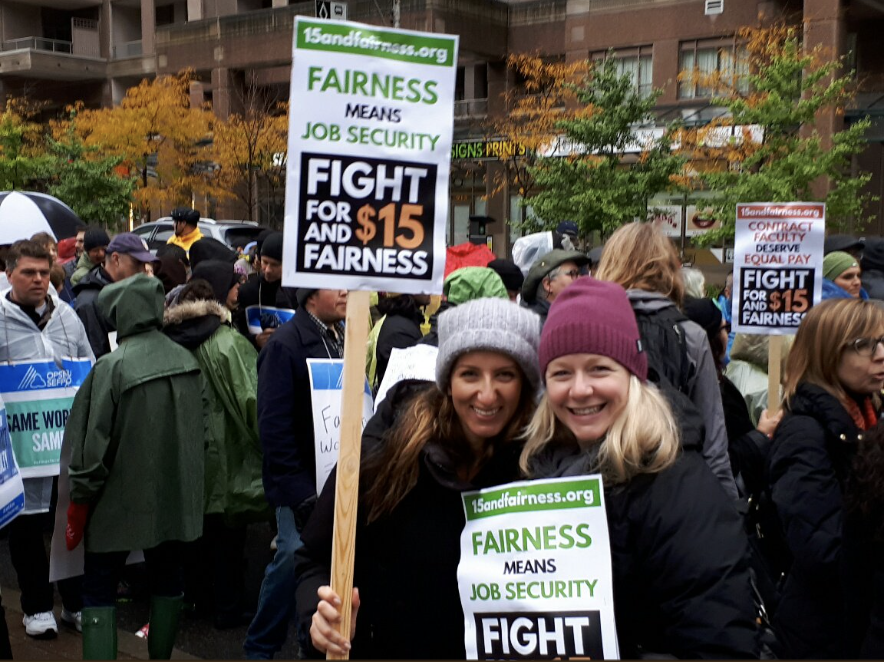More than 3,000 striking faculty from Ontario colleges and supporters gathered at Queen’s Park on Thursday, just hours after negotiations resumed between the Ontario Public Service Employees’ Union (OPSEU), the union representing faculty, and the College Employer Council.
The government ordered the two sides back to the table on Wednesday.
Classes have been cancelled at Ontario’s 24 publicly funded colleges since October 16, when the union and the colleges failed to reach a new contract. More than 12,000 faculty, counsellors and librarians have been on strike since.
Union president Smokey Thomas told the crowd there was “no magic” to bargaining being called the day before the scheduled rally.
While supporters rallied in front of the legislature, bargaining took place a few blocks away at the Sheraton Hotel. J.P. Hornick, chair of the bargaining committee, sent a text message to protesters, telling them to cry loud enough so the colleges could hear their concerns.
The main concern is the high number of part-time faculty at Ontario colleges, many of whom teach for years without securing full-time jobs. At some schools, more than 80 per cent of faculty work on a contract or part-time basis. The union is asking for positions to be split evenly between full-time and part-time.
The union isn’t the only one wanting this.
Colleges help make the province successful, but that’s not because of the administrators, Nour Alideeb, chairperson of the Canadian Federation of Students of Ontario told the crowd. That success comes “off the backs” of college faculty and staff, she said.
“Your working conditions are our learning conditions,” Alideeb told the cheering crowd.
Contract faculty have a harder time supporting students. William Payne teaches in the community worker program at George Brown College in Toronto. He is only paid for the time he teaches in class, not the time he spends marking or meeting students. Because he’s part-time, he can’t be on campus every day to support his students, and that work falls to full-time faculty, he said.
James Compton, president of the Canadian Association of University Teachers, said universities are also seeing an increase in contract work. These professors, like college faculty, also struggle to have academic freedom, he said. He told the crowd he’s received letters from university faculty in Australia and Denmark supporting Ontario’s striking colleges.
Paramedic students at Durham College in Oshawa have been meeting and practising during the strike. They’re starting to worry they won’t be able to write government licensing exams in the spring if the semester gets pushed back, said Sam Xerri, who is in his final year of the program. Most of the professors are current or past paramedics, and students need to learn from them so they can pass their exams.
Xerri said most professors in the program are part-time. He said it’s “reasonable” for there to be more full-time faculty. Professors need more job security and predictable schedules, he said.
Paula Greenberg, a student at Humber College in Toronto, has spent the strike talking to the media about why students support striking faculty.
“All of our teachers have spent thousands of dollars to be experts in their fields, and they’re getting paid peanuts. It’s ridiculous,” she said.
For Greenberg, the strike is about unfair working conditions in the larger workforce, the realities students will “have to deal with when we graduate.”
Greenberg knows, unstable working conditions forced her back to school. She graduated from OCAD University eight years ago with a degree in textile design. She called herself “an anomaly”; she had two full-time jobs in the industry, working with a toy company and a mascot company. But she struggled to save for a house or car and watched many classmates fight for contracts or leave the industry. She enrolled in an accelerated child and youth care program. She began the 16-month program in September.
Many blamed lack of government funding for colleges for creating the need for contract staff. They also reminded the crowd — and the government — of the upcoming provincial election, scheduled for June 2018. Provincial NDP Leader Andrea Horwath told the crowd an NDP government would fix the problems in the system, and involve frontline college staff in decisions. She said a Conservative government would only make things worse.
Speaking on behalf of students, Nour Alideeb was more blunt. “We’re going to be watching you,” she said, addressing the government. Students will remember what the government does in this situation when they cast ballots next year, she said.
Meagan Gillmore is rabble.ca’s labour reporter.
Like this article? Please chip in to keep stories like these coming.





